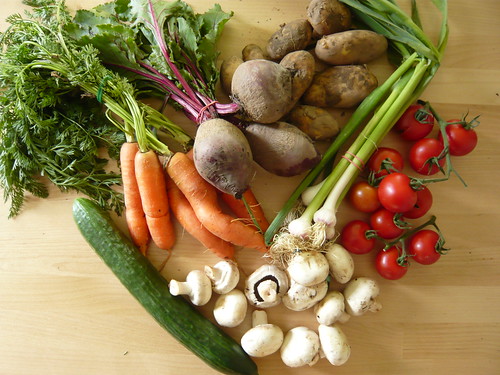The Ecological Meal

flickr photo shared by WordRidden under a Creative Commons ( BY ) license
Introduction
"When we eat, we literally take parts of Earth into our bodies and Earth becomes us. When we walk, it is Earth’s energy—bequeathed from the Sun—that walks us!" - Chris Uhl
Food is more than sticking yummy things into our mouth. When we eat, we’re intimately participating in the enigmatic movement of life. Something that was once alive, now becomes fuel that animates us and gives us energy. And one day we’ll give ourselves back to earth, for other lifeforms to feast upon.
Food is also more than going to the supermarket and throwing groceries into a bag. The global industrial food system is gigantic and affects every being on the planet. When throwing that banana into our grocery bag, do we stop to consider that this yummy, yellow item has traveled over more than half of the earth, with a complex number of stops and middlemen along the way, before ending up in our bag? How is the banana affecting the environment... or other people? How are the living conditions for the workers at the banana plantation? Who is profiting from our banana? Being responsible consumers is paramount in an age where our political power to a great extent lies in our consumer choices.
Also, food is the central moment of celebration in any culture. Can you imagine getting together with your family, relatives or friends to have a good time, without eating or drinking anything? It would be weird, right? Food and drinks have always been the cohesive agent bringing people together. Because food and drinks bring joy and satisfaction. No matter where we are.
In this activity, we’ll try to bring awareness to the multitude of aspects of food and have a meal together!
Activity Type
Group/Experiential
Duration
5 h
Learning Outcomes
To understand food from a viewpoint of sustainability
To become more attuned with food as a local resource
To understand the central part food plays in our lives, both socially and culturally
Instructions
Have a meal together! The challenge is to do it in a way that is as cheap as possible, that has as little environmental impact as possible, that is as socially beneficial as possible, and that acknowledges the deep meaning of food in our daily lives. For instance, use a footprint calculator to measure the environmental impact. See how spending money can be avoided (remember that the most ecological and economical is to eat food that otherwise wouldn’t be eaten). If you present your project in the right way (what is the deeper purpose of this meal?) people might even want to give you what you need. And maybe you want to invite them in return?
Required Materials and Tools:
A kitchen
Some money to buy ingredients, if necessary.
Step-by-Step Instructions:
Decide on the menu in the group.
Gather ingredients: try to find ingredients that are produced less than 100 km from where you live; this normally includes seasonal food; try to keep away products like beef (especially meat coming from ruminants which emit a lot of methane). Diary products such as milk or cheese, especially coming from ruminants are also inadvisable.
Prepare the meal! Try to use as little energy as possible, the things that could be eaten raw, should be eaten raw.
Eat together (How can you bring awareness to eating and the act of sharing a meal together, e.g. see the activity “Eating mindfully” under module “The Garden and the Farm”).
Do the dishes as ecologically as possible! For instance, try not to use running water while doing the dishes, but rather, put water in a basin.
Resources
Reflection
What importance does food play in our lives? What is the meaning of gathering together around a meal like this?
What interconnections do you notice between supporting local workers and eating ecologically?
What else did you learn from this activity?
Instructions for Submission
Upload a picture of the ready-made meal and submit a brief story of each ingredient, reflecting on it through the 4 dimensional lens (ecological, economic, social, cultural). Try to include answers in your submission to questions such as: What are the most intriguing aspects of this meal and the story behind it? What could have been done otherwise to make the meal more sustainable? Instructions on how to upload photos and how to submit things in Moodle can be found here: Instructions on Submission&Uploading
Instructions for Assessment
Provide feedback to at least one participant that has done this activity. Instructions on providing feedback can be found here: Instructions on Feedback
Related Topics
Author
Creative Commons - ySI4R Content Team (Inspired by Chris Uhl’s “The ecological meal”)
| Status | Discussion | Started by | Last post | Replies | Actions |
|---|---|---|---|---|---|
|
The Ecological Meal
Locked
|
|
|
1 |
|
|
|
Ecological meal
Locked
|
|
|
1 |
|
|
|
Ecological Meal
Locked
|
|
|
1 |
|
|
|
|
|
0 |
|